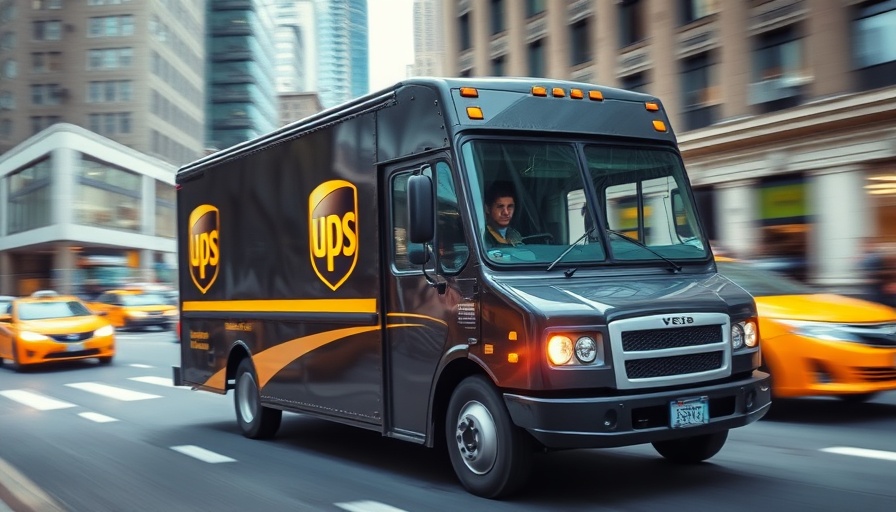
The Shadow of Downsizing: UPS's Massive Job Cuts Amid E-commerce Shifts
In an alarming announcement, UPS has revealed plans to cut approximately 20,000 jobs as the company prepares to cut its Amazon shipments by nearly half. This significant downsizing reflects not only a shift in UPS's business strategy but also underscores the ongoing transformation within the e-commerce landscape, particularly as consumer shopping habits continue to evolve. In a world increasingly reliant on digital purchasing, the repercussions of UPS’s decision may signal broader trends for the industry.
Connecting the Dots: Why the Cuts Matter
For many, UPS may represent the backbone of package delivery and logistics in America. Yet, as e-commerce giants focus on reducing overhead and maximizing efficiency, traditional shipping partners face mounting pressure. In this context, the anticipated job cuts highlight key economic forecasts, where many businesses are reassessing their operations to meet changing demands. According to industry insights, logistic companies like UPS are forced to innovate their delivery ecosystems, often at the expense of part of their workforce.
Forecasting a Changing Landscape in Delivery Services
The reduction in workforce is a significant move that raises questions about the future of delivery services, particularly in Silicon Valley, a hub for e-commerce innovation. As venture capital continues to funnel into startups that can arguably optimize logistics using technology, the market dynamics shift. For UPS, the challenge is adapting to innovations that promise faster, more efficient shipping solutions, which can potentially render traditional logistics models less viable. If the trend continues, it presents an opportunity for startups focusing on automation and AI in their delivery systems to capitalize on UPS's strategic retreat.
Local Perspectives: What It Means for Bay Area Businesses
In the Bay Area, where e-commerce growth is palpable, local businesses must navigate this new landscape with agility. UPS’s decision may ripple through the community—affecting supply chains, consumer behavior, and the gig economy. Mergers and acquisitions in the delivery sector may rise as companies scramble to secure partnerships that can help them maintain competitive delivery speeds without relying on UPS. New startups may emerge to fill the gaps left by UPS, leading to a potential surge in venture capital funding for logistics innovations.
What Experts Are Saying
Market analysts are keeping a close watch on UPS's strategy, with many suggesting that the decision to scale back Amazon shipments is both a retreat and a calculated move to recalibrate their business model. “This could well be a pivot towards greater sustainability within the business,” explains a logistics expert. “As consumer behavior shifts, so too must corporate strategies.” The intersection of employment trends and technological advancement illustrates not just a challenge for UPS, but a broader commentary on how even stalwarts need to adapt to remain relevant.
The Emotional Impact on Workforce
The human element of these job cuts bears significant emotional weight. For those impacted, the decision resonates far beyond corporate strategies—it affects livelihoods and the small businesses that depend on reliable delivery services. The economic forecast suggests that the Bay Area community, often cited for its entrepreneurial spirit, must come together to support affected workers. There are opportunities for local businesses to create positions in light of these changes, further weaving resilience into the fabric of the Bay Area economy.
Finding Opportunities Amid Uncertainty
Despite the looming cuts, businesses can emerge stronger by embracing change and innovation. Leaders across the Bay Area need to consider new business growth strategies that accommodate these industry shifts. Focusing on sustainable practices not only addresses consumer preferences but also positions businesses favorably in the face of future challenges. Collaborative efforts in corporate social responsibility could open diverse avenues for partnerships among tech companies, startups, and giants like UPS.
As the landscape shifts beneath our feet, it is crucial to remain informed and proactive. When faced with uncertainty, businesses must integrate risk factors into their overall strategy while nurturing the workforce and community that supports them. The interplay of employment and economic health will ultimately define the future trajectory of not just UPS, but the broader spectrum of retail and logistics in a post-pandemic world.
Awareness and action are vital—staying informed about corporate trends and employment laws, engaging in local networking events, and understanding the implications for business leaders and workers alike can empower stakeholders. Exploring avenues for innovation might just uncover new partnerships that drive progress and community resilience.
 Add Row
Add Row  Add
Add 



Write A Comment